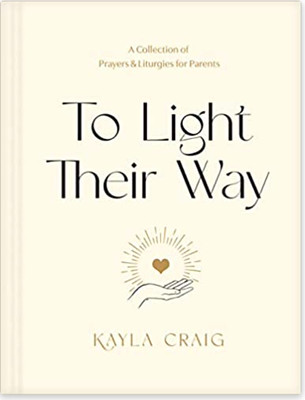A former journalist, Kayla Craig is adamant about paying attention and embracing curiosity in both her writing and parenting. Inspired by her four children, her new book of nuanced and nurturing prayers for parents is bursting with warmth and welcome, inviting us all to enter into a deeper love of God and neighbor as we raise compassionate kids in a chaotic world. It’s a grace to welcome Kayla to the farm’s front porch today…
guest post by Kayla Craig
I’m fresh out of words these days. Maybe you are too.
With each new headline, I feel the land shift beneath my feet. I pull my children close and try to regain my balance as all creation groans.
The past few years have given us so much collective pain, so much internal sorrow.
“Does God hear our tear-soaked prayers?”
What is this world we are giving our children?
How, in the swirl of all this pain, can I find the words to pray?
And if I’m really honest, I also wonder: Does God hear our tear-soaked prayers?
We feel off our axis because we are off our axis.
We live in the now-and-not-yet, the mystery of God’s upside-down kingdom. We ache for the larger pains of this world, losing our footing in the lines drawn in the sand as we hold the tension of parenting. We comb out tiny curls and cut crusts off sandwiches, watch chubby toddlers become broody teens as we try to find our center of gravity, as we stand on crumbling land, feeling the fault lines fracture.
The mystery we plant our feet firmly into is that the Maker of all things bright and beautiful enters our pain and holds our suffering in the palm of His hand.
When we accept the divine invitation into prayer for our children, for our neighbors, and for ourselves, God does not demand perfect words—or any words at all.
In our call-and-response world, it’s hard to believe that our presence in and of itself can be a prayer, our parenting a kind of poetry lived out with every late night and early morning.
What if, when we don’t have the words to pray, God is inviting us to listen?









Prayer isn’t about selecting the most lyrical prose or saying a perfect string of words. It’s about entering into the ongoing dialogue the Creator of all things is already having with us every day.
“What if, when we don’t have the words to pray, God is inviting us to listen?”
When we weep at the grief circling our families, we pray.
When we lament the unjust headlines, we pray.
When we celebrate the joy, beauty, and love around us, we pray.
When we seek our rootedness in Christ alone, we pray.
God requires no sonnets or soliloquies—He just desires our presence.
My four-year-old asked me recently if we can see God, and I told him we see God in the way a rainbow appears after a storm, we feel God in the way his sister cups her hand on my cheek, we hear God in the giggles of his brothers as they leap on the trampoline. Across cultures and generations, people have sought answers about how to interact with God. God requires no special sacrifice, demands no magic words or rituals.
God just wants us.
********
Though I’ve been praying in some form or another since I was young, it took a critically ill child to bring me to the rootedness of written prayers—or, as many traditions call them, liturgies.
“Prayer isn’t about selecting the most lyrical prose or saying a perfect string of words. It’s about entering into the ongoing dialogue the Creator of all things is already having with us every day.”
When a respiratory virus attacked my three-year-old daughter’s lungs, she relied on a ventilator to keep her alive. I sat by her too-big hospital bed, searching for reminders of life as her sedated body struggled under the weight of drips and machines.
I wrestled with fears and doubts, and I wasn’t sure if I could hand them over to God. I didn’t know how. So instead, I held on to them. I couldn’t hold my daughter. But I could embrace my anger and fear, clutching them close to my chest.
There I was, married to a pastor, and I couldn’t pray. There I was, a Christian for the previous thirty years, and I couldn’t muster any words.
People told me they were praying for our little girl. I guess your prayers don’t work, I thought. I knew that God wasn’t a genie in a bottle who would just grant our wish if we all prayed hard enough. But still, I struggled to find words that rang true in the walls of that hospital room.
On one of my days at home, I checked the mailbox. Bills and junk mail spilled out, but there was a package nestled inside too. A book of prayers. There in my mailbox was an invitation into conversation with God—and permission to rest from the exhaustion of finding just the right words.
“As I prayed, the written words became my own pleas and petitions, jumping off the page and nestling into my soul.”
I didn’t have to have it all together. I didn’t have to have the perfect quiet space to center my thoughts—the beeps and buzzes of medical machines would do. All I had to do was open to the page and read, recite, and repeat until I felt my heart rate begin to calm, until I was no longer tensing my shoulders, until I could release the breaths I’d been holding for too long.
We don’t need the perfect location or perfect circumstances or perfect words to pray. If we wait for that, we never will.
When everything crumbled, the prayers of another voice comforted me. And as I prayed, the written words became my own pleas and petitions, jumping off the page and nestling into my soul.
The warmth and welcome of the body of Christ says, I’ll lift your hands for you.
And as I learned in those thin spaces in the intensive care unit, the body of Christ also says: You don’t have the words? Here, take mine.
After a month in the hospital, with the care of a compassionate crew of doctors and nurses, my husband and I brought our daughter home.
I still didn’t have any concrete answers about the mystery of prayer. I grieved for the parents who left the intensive care unit with empty seats in their minivans. I celebrated my daughter’s return to health. I sat in the tension.
When we arrived home, unloading bag after bag of belongings, I clipped the plastic hospital ID bracelets from our wrists and tossed them into the trash. But I held on to the book.
The prayers of others had become my prayers.
Kayla and her pastor-husband, Jonny, live in a 110-year-old former convent in their Iowa hometown, where they’re raising loud and lion-hearted children who joined their family through birth and adoption. She shares her prayers online at Liturgies for Parents.
What do you pray when you don’t have the words? Kayla Craig’s To Light Their Way: A Collection of Prayers & Liturgies for Parents is a beautiful gathering of more than 100 nuanced and nurturing prayers guiding you into an intentional conversation with God for your children and the world they live in.
Filled with more than 100 modern liturgies, To Light Their Way contains specific prayers for
- precious family milestones,
- ordinary moments of everyday grace,
- times of transition as your children age,
- grief and lament when the world leaves you weary,
- your own heart on the parenting journey, and
- specific holidays and holy days.
In an age of distraction and overwhelm, finding the words to meaningfully pray for our children—and for our journey as parents—can feel impossible.
At the core of To Light Their Way is the deepest of prayers: that our children will experience the love of God so profoundly that their lives will be an outpouring of love that lights up the world.
With each preorder of To Light Their Way, Kayla is offering a five-day guided devotional for overwhelmed parents, along with printable breath prayer cards inspired by Scripture. Click here for more info!
[ Our humble thanks to Tyndale for their partnership in today’s devotion ]








